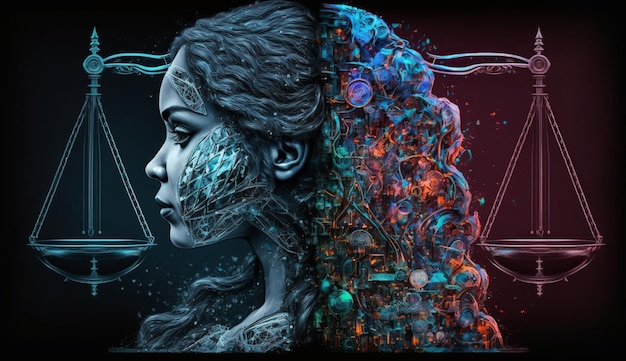The future of AI and social justice is a pressing topic that intertwines technology with ethical considerations, raising critical questions about equity in artificial intelligence society. As debate intensifies around AI ethics, prominent figures like Ruha Benjamin are urging us to think critically about the implications of technological advancement on marginalized communities. Advocates of AI often present their visions as paths to progress, yet without addressing underlying biases, these technologies may perpetuate existing inequalities rather than resolve them. Benjamin’s insights highlight that social justice in technology must center on inclusive innovation that considers the human experience, not merely algorithmic efficiency. As we navigate the future of humanity in an increasingly automated world, the intersection of AI and social justice calls for a reevaluation of our collective goals and values, ensuring that all voices are represented in shaping the future.
Exploring the intersection of artificial intelligence and equitable practices reveals a nuanced narrative about advancement in our society. The dialogue around technological progress frequently overlooks the implications it carries for social equity, a theme underscored by thinkers like Ruha Benjamin. In this context, the moral foundation of technology must be scrutinized, focusing on how these innovations can either uplift the disadvantaged or deepen systemic disparities. By embracing a broader understanding of technological impacts, we can envision a future where AI serves as a tool for empowerment rather than oppression. This discourse not only examines the role of technology but also challenges us to rethink the structures of power and advantage that dictate our societal landscape.
AI Ethics and the Need for Diverse Perspectives
In the landscape of AI ethics, it is increasingly vital to recognize the limitations imposed by a narrow perspective. This paradox exists where the technology that claims to liberate us also perpetuates systems of oppression. Ruha Benjamin asserts that relying solely on technical expertise is problematic, as it tends to overlook the necessary inclusivity of diverse voices, especially from marginalized communities. To create AI solutions that genuinely serve the common good, it is crucial to involve individuals who understand the societal implications of technology, alongside the developers who build them.
The need for diverse perspectives extends to all facets of AI development and implementation. As discussed in Benjamin’s Tanner Lectures, the assumption that algorithms and data alone can make ethical decisions is fundamentally flawed. Ethics in AI must incorporate the rich tapestry of human experiences, historical contexts, and social justice considerations. Only by fostering an inclusive dialogue that blends technical prowess with social awareness can we devise AI systems capable of genuinely enhancing the quality of life for all members of society.
The Role of AI in Social Justice Movements
Artificial intelligence plays a dual role in social justice movements—both as a tool for empowerment and a mechanism of oppression. Ruha Benjamin highlights the darker implications of AI technologies, such as facial recognition systems that disproportionately affect marginalized populations. These technologies often reinforce societal biases rather than dismantle them, leading to erroneous arrests and unjust treatment of individuals already facing systemic inequalities. Recognizing this, advocates for social justice must remain vigilant about how AI is utilized in society.
Conversely, AI can also be harnessed for positive change within social justice movements. By leveraging machine learning and data analytics, activists can analyze patterns of inequality, predict areas of need, and mobilize resources more effectively. Therefore, it is essential for social justice advocates to co-create AI tools that prioritize equity, ensuring these technologies serve the collective good rather than protect elite interests. Ultimately, advocating for social justice in technology means actively shaping the direction of AI to reflect values of inclusion, fairness, and accountability.
The Future of AI and Social Justice: A Collaborative Vision?
The intersection of AI and social justice encapsulates a transformative future where technology serves humanity rather than undermines it. Ruha Benjamin urges us to stretch our imaginations to envision what a world could look like if AI were designed with equity at its core. By encouraging collaboration amongst technologists, artists, and social scientists, we can build AI systems that proactively address social issues rather than exacerbate them. This call to action is not just a plea for reform; it is a challenge to reimagine the foundational principles that govern technology.
Envisioning this future requires a commitment to dismantling existing power structures that prioritize short-term gains over long-term social benefits. By placing the lens of social justice at the center of AI development, we can foster innovative solutions that elevate the human experience. Whether it’s through enhancing public services or ensuring that AI-driven decisions are made transparently, the future of AI hinges on our willingness to dream together, collectively addressing the ethical challenges posed by this disruptive technology. This collaborative vision underscores the promise that AI can indeed play a pivotal role in shaping a more just and equitable future.
Creativity and Imagination in AI Development
Ruha Benjamin emphasizes the importance of creativity and imagination in the development of AI technologies that aspire to promote social welfare. As we look to the future, it is imperative to not only critique existing technologies but also to envision alternatives that transcend current limitations. Benjamin calls for a cultural shift within institutions where technical problem-solving is complemented by artistic and imaginative thinking. By embracing this interdisciplinary approach, we can cultivate innovative solutions that challenge the status quo and expand the horizons of what is possible in our society.
Moreover, fostering creativity in AI development encourages the exploration of unconventional ideas, such as reimagining public transportation through automated systems that prioritize accessibility and efficiency. Benjamin’s call to action suggests that a focus on public goods—like affordable housing and community wellness—should be at the forefront of AI design, countering the tendency to idolize speculative technologies that serve the privileged few. By weaving together creativity with ethical considerations, we can unlock the full potential of AI as a force for good, crafting a future that is equitable and inclusive.
Trust and Responsibility in AI Technology
The concept of trust plays a critical role in shaping public perceptions of AI technology, especially within the context of social justice. Ruha Benjamin argues that the assumption of AI being neutral or objective is a dangerous fallacy that undermines trust in these systems. Historically, marginalized groups have been disproportionately affected by abuses of technology, leading to a justified skepticism regarding the motivations behind AI implementations. Building trust in AI demands transparency about its development, implementation, and potential ramifications on society.
To foster a sense of responsibility among tech developers, it is vital for them to engage with communities that are directly impacted by their innovations. This involves incorporating feedback mechanisms, ensuring that those most affected by AI systems have a voice in how these technologies are designed and utilized. While the promise of AI holds significant potential for advancement, maintaining public trust will depend on the ethical considerations and social responsibilities that accompany its development.
The Impact of AI on Marginalized Communities
The impact of artificial intelligence on marginalized communities is an urgent issue that demands scrutiny and proactive measures. Ruha Benjamin articulates the dangers posed by algorithms that have not been trained with diverse data sets, which often lead to biased outcomes, reinforcing systemic inequalities. Facial recognition technology and predictive policing are pertinent examples where AI has adversely affected marginalized groups through discrimination or wrongful profiling. For the future of humanity to be equitable, it is crucial to address these disparities and ensure that all communities are represented in the data driving AI systems.
Addressing these impacts also involves evaluating and transforming the pipelines through which AI technologies are developed. If the creators of AI systems lack awareness of social justice issues or do not include diverse perspectives, the resulting technologies may perpetuate the very problems they claim to solve. Empowering marginalized voices in the tech industry and cultivating partnerships with community organizations is essential to mitigating harm. These collaborations can help shape AI tools that honor the dignity and rights of every individual, ensuring that technological progress is synonymous with social progress.
Reimagining Our Relationship with Technology
In her provocative lectures, Ruha Benjamin invites us to rethink our relationship with technology by challenging the narrative that equates progress with relentless advancement. Instead, Benjamin argues for a reimagining of technology that prioritizes the well-being of individuals over profit margins. Historically, technologies have often concentrated power in the hands of a few while marginalizing the needs and voices of the majority. To create an inclusive future, we must approach technology as a community-centric endeavor rather than a commodity dictated by market demands.
This shift involves fostering a culture of critical engagement with technology that encourages communities to envision and claim their rightful place in the design of AI. By bridging the gap between technologists and the general public, we can cultivate a landscape where technology is developed not just for efficiency, but for equity and dignity. As we navigate this journey into the future of AI, it is essential to prioritize collaborative spirit and communal benefit, fundamentally changing how we perceive and interact with technological advancements.
The Intersection of AI and Human Values
The intersection of artificial intelligence and human values is a recurring theme in Ruha Benjamin’s discourse on the future of technology. As AI systems become entwined with critical aspects of daily life, it is essential to ground these technologies in the ethics and values that prioritize human dignity and social justice. Benjamin argues that the conversations surrounding AI should encompass broader societal implications rather than remain confined within technical confines. Emphasizing human values in AI design involves questioning who benefits from technology and who bears the weight of its consequences.
Moreover, integrating human values into AI also means fostering empathy and compassion within technical frameworks. Rather than relying exclusively on mathematical calculations, AI systems should incorporate narratives that reflect the diverse experiences of individuals. By embedding human stories and ethical considerations into AI development, we can create a foundation for technology that upholds the principles of justice and equity. This ethical approach promises a future where AI nurtures societal growth rather than stifles it, enabling a richer, fuller experience of humanity for generations to come.
AI as a Tool for Empowering Communities
Artificial intelligence holds the potential to empower communities by providing innovative solutions to longstanding challenges. Ruha Benjamin advocates for leveraging AI not just as a technological development but as a tool for enhancing civic engagement and fostering social justice. Communities can harness AI to analyze local data, identify pressing issues, and mobilize resources effectively, ensuring that the benefits of technology reach those who need them most. This approach transforms AI from a symbol of opulence into a vehicle for social change.
However, the empowerment of communities through AI must be pursued with caution and a critical eye. It is essential to navigate the ethical landscape surrounding AI risks and ensure that tools designed for empowerment do not inadvertently reinforce existing power imbalances. By fostering inclusive practices that engage local stakeholders in the creation and deployment of AI technologies, we can mitigate potential harms while maximizing the positive impacts of artificial intelligence. Ultimately, this interconnectedness builds more resilient communities and enhances the potential for social transformation.
Frequently Asked Questions
How might AI ethics influence the future of AI and social justice?
AI ethics plays a critical role in shaping the future of AI and social justice by guiding the development and deployment of technologies that prioritize fairness, accountability, and transparency. This framework encourages policymakers and technologists to consider the societal impacts of AI systems, ensuring they do not perpetuate existing biases or contribute to inequality.
What are the implications of Ruha Benjamin’s views on AI and social justice for the future of humanity?
Ruha Benjamin argues that the future of humanity should not be solely defined by AI-driven technologies motivated by self-interest, particularly from tech elites. Her insights emphasize the need for a collective vision that prioritizes social justice and ethical considerations, urging society to rethink how AI can be leveraged for the greater good rather than deepening systemic oppression.
In what ways can social justice in technology address biases in AI systems?
Social justice in technology promotes the development of AI systems that actively work to identify and mitigate biases present in algorithms. By integrating diverse perspectives and inclusive practices in AI design, technology can better serve marginalized communities, ultimately fostering a more equitable future.
Why is a focus on creativity essential for the future of AI and social justice?
A focus on creativity is essential for the future of AI and social justice because it encourages innovative thinking that transcends the limitations of current technological solutions. As Ruha Benjamin suggests, integrating the arts and humanities into technological discussions can inspire new approaches to dismantling systemic barriers and envisioning a just society, allowing for a more profound reimagining of our social fabric.
How can understanding the historical context improve the future of AI and its relation to social justice?
Understanding historical context is vital for developing AI technologies that do not repeat past injustices, such as those stemming from the eugenics movement. By recognizing how social and historical factors influence current societal norms, developers can create more ethical AI systems that promote social justice and equity.
What role should universities play in the intersection of AI and social justice?
Universities should prioritize interdisciplinary approaches that merge technical expertise with social sciences and humanities to explore the implications of AI and social justice. By fostering creative inquiry and critical discourse, academic institutions can help shape a future where technology serves humanity while addressing systemic inequities.
What does Ruha Benjamin suggest about the vision for AI and its societal impact?
Ruha Benjamin suggests that instead of accepting a dystopian future shaped by AI, we must critically engage with our technological aspirations. She advocates for reimagining society by focusing on creating public goods and addressing inequalities, ultimately working towards a future that reflects our highest values and a fairer distribution of resources.
How can society dismantle mental barriers to envision a just future with AI?
To dismantle mental barriers, society must challenge conventional narratives which limit our imagination about technological futures. Encouraging open dialogue and diverse perspectives can help us rethink what is possible with AI, pushing us to envision a world that transcends traditional boundaries and prioritizes social justice.
| Key Points | Explanation |
|---|---|
| AI and Social Justice | Ruha Benjamin discusses how AI’s current applications often deepen oppression rather than promote justice. |
| Distrust in Tech Elites | Benjamin argues that tech billionaires prioritizing self-interest cannot be trusted as advocates for the collective good. |
| Limitations of AI Technologies | Technologies touted as efficient can perpetuate systemic inequalities and historical injustices. |
| Need for Broader Perspectives | Benjamin emphasizes the necessity of including diverse voices and expertise beyond technical skills in the development of AI. |
| Call for Imagination | A renewed focus on creativity in addressing societal issues and reimagining technological solutions was advocated. |
| Critical Reflection | Benjamin encourages critical thinking combined with creative exploration in envisioning a just future. |
Summary
The future of AI and social justice holds great potential if we dare to envision a radically different reality, as articulated by Ruha Benjamin. She encourages us to challenge the status quo and question the motivations behind AI technologies that are often perceived as neutral. As we look ahead, it is crucial to integrate diverse, creative insights alongside technical expertise to disrupt cycles of oppression and create a more equitable society. By doing so, we can reimagine AI’s role to foster justice and human flourishing rather than merely addressing existing harms.



